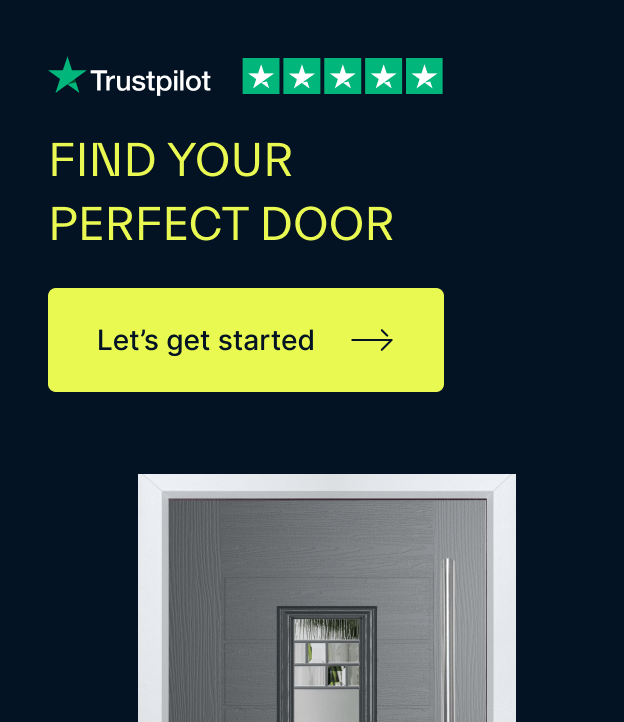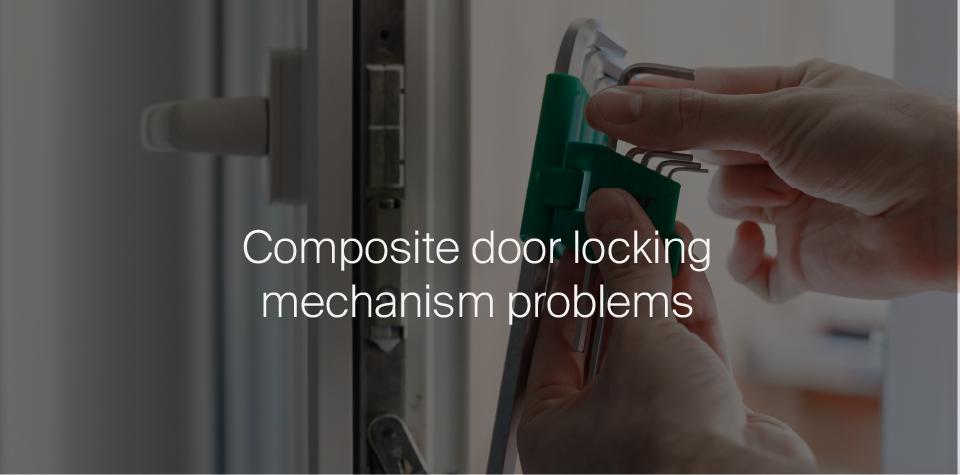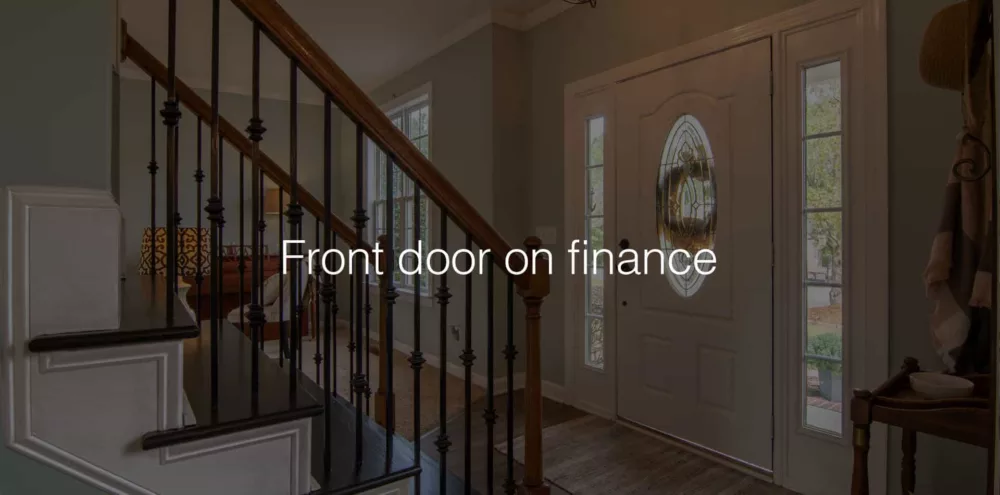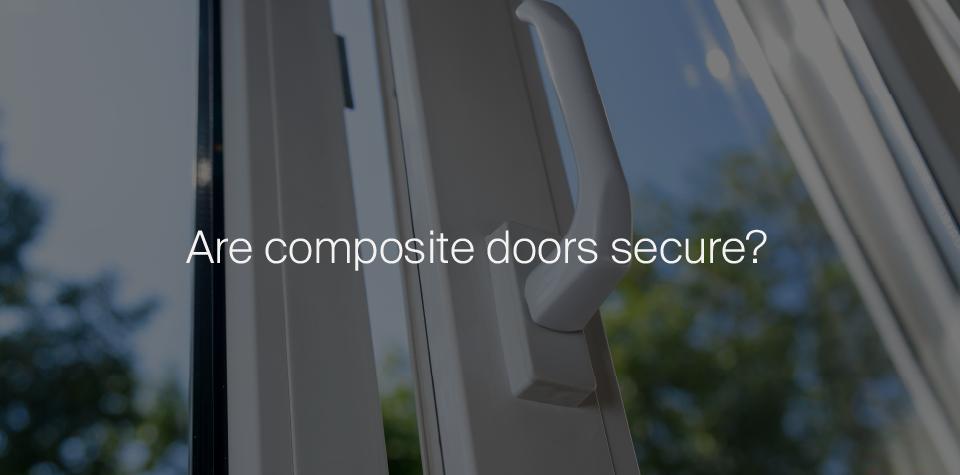Composite Door Locking Mechanism Problems
Is your composite door lock sticking, completely stuck, or not working? Well, you've come to the right place.
In this article, we're going to talk about composite doors. We'll also discuss the common problems that may be causing your front door lock issues. Finally, we'll address some frequently asked questions.
How Is a Composite Door Different?
Composite doors are made from materials like uPVC, glass-reinforced plastic, and wood combined under pressurised conditions.
They're known to be safer, more resilient and more durable. However, they're not free from problems, and although they typically last a very long time, certain weather conditions and other variables can cause issues.
Are you interested to learn more? Why not read more about composite doors?
Different Types of Doors
This guide is made specifically for composite doors and problems with their locking mechanisms.
That means if you have one of the other common door types, it likely won't apply to you (unless you have a similar uPVC door in certain aspects).
If you don't have a composite door, you might have:
- A solid wood door: Wooden doors are incredibly common and offer excellent insulation for your home. Their door frame is made entirely from wood. And, because you can easily paint them, they can be made to match any home. However, a solid wood door is less reliable and secure than a composite door.
- A hollow wood door: These are a very popular choice and are often quite affordable; however, they're not quite suitable for home entrances due to being easily breakable (because they're entirely hollow). They are better suited for interior doors.
- A uPVC door: Unlike hollow wood doors, an uPVC door is as popular as the front and back doors and is very durable (although not as much as a composite door). A composite door is better at "enduring the elements" and will maintain its appearance longer. A uPVC door lock may resemble a composite door's locking mechanism.
But now that we've covered this, let's get into the task at hand:
Common Problems With Composite Doors (And Solutions)
A faulty door lock can make you quite concerned about the safety of your home; it might even leave you wondering how to lock a composite door when the problem is just that the lock is broken.
Considering that the majority of burglaries go unsolved, and over half happen through your front door, it's something you want to get resolved as soon as possible. Let's explore the common problems with composite doors and how they may cause lock issues:
Your door has warped
Composite doors are not impervious to this pervasive problem: warping. A frequent reason for this is not lifting the handle when you close the door.
When you shut the door, the weight of it rests on the latch: by lifting the handle and keeping the door lock engaged, you ensure that your door properly engages the bottom and top composite door locks to prevent warping and improve support.
A warped door can be difficult to close and lock and lets air out, which could cause your energy consumption to go up: it's both unsafe and expensive. In addition, even temperature changes can cause warping in your door between 3-5 mm. When the temperature rises, your door can swell and expand, making it difficult to open and close, let alone lock.
Usually, you'll be able to go to your supplier and get a replacement, as most composite doors come with a 10-year guarantee. Typically this is the only solution if your warping has become too severe.
Your euro cylinder is faulty
A faulty euro cylinder will need to be replaced by a locksmith. You'll know if this is occurring if you're entirely unable to lock your door, and this most often happens with older doors or if they're not high-quality. A euro cylinder comprises a core, door lock body, fixing hole, and a revolving cam.
Your composite door gearbox has failed
Gearbox failure has symptoms; you'll find that your door handle likely won't be able to move or won't go down. Unfortunately, if this happens, it'll need to either be repaired by a professional or replaced altogether.
Your door has dropped
This can make closing, opening and locking the door difficult as the locking points are no longer aligned. Continuing to use your locking mechanism in this state can cause a lot of damage.
However, unlike the other composite door problems we've mentioned, this one can be fixed by tightening or adjusting the hinges. When the door is finally in the proper position, you should have no problem closing, opening, locking and unlocking the door.
Your mechanism is faulty
A faulty composite door mechanism in your locking system is evidenced by a door that won't shut very easily. You might be able to fix it yourself by replacing the central door lock case; however, in some situations, you may have to replace the entire mechanism.
This mechanism runs along the composite door and operates the various locking points.
Your composite door lock is sticking.
Sticky locks occur when it becomes challenging to put in your key, turn it, or take it out. Usually, this is caused by debris build-up in the lock's internal mechanism and can be rectified by using a silicone lubricant for your door cylinder and a grease lubricant for your locking mechanism.
Ideally, you'd want to do this every six months to prevent reoccurrence in your locking system.
Your key is stuck or won't work at all
If your key is stuck or won't work, then your problem might not even be with the lock. A poorly cut key can cause these issues, or your multi-point locking system needs to be fixed. The cylinder can get stuck behind the latch release mechanism.
If your key is completely stuck in the lock, don't try to force it out or disassemble the lock yourself. Your best bet is to phone a local locksmith who can correctly diagnose and fix the issue. The same reasoning applies when your key won't work at all.
Typically, fixing this kind of issue should take half an hour or even less.
Preventing Future Locking Problems For Good
The best way to prevent composite door slam lock problems, among other things, is to buy a high-quality door in the first place. While this may be a costly initial investment, it's ultimately a better decision, as you'll save money on repairs and it'll last much longer.
Composite doors are durable and strong and have energy-efficient features to prevent heat loss.
That said, you can do two other things to prevent problems, even after purchasing a high-quality door. These include:
Do regular maintenance
You should thoroughly investigate your door every six months to ensure it's still in good condition. Consider this the equivalent of going to a bi-yearly medical with your doctor. Investigate for signs of any of the problems we've already mentioned.
Reduce pressure on your door lock
Putting the handle up when your composite door is closed ensures that the locking points are adequately engaged, reducing the composite door warping risk and decreasing pressure on the locking mechanism.
FAQs
Are there problems with composite doors?
It's rare for a composite door to have problems; however, there is a slight chance they may experience some of the issues you'd expect with more traditional doors: dropped hinges, door swelling and sticky door locks.
Can you change the lock on a composite door?
Yes, if you're having issues with the lock of your composite door, you can have it replaced. While these doors are high-quality, problems can still occur, albeit rarely.
What do you do if your door lock is stuck?
If your front door locking mechanism is stuck, spraying lubricant into the lock's keyhole may do the trick by loosening debris that might be stuck in your lock, preventing it from turning. We suggest that you don't use WD40.
Why do I have to slam my door to close it?
Needing to use force to close your composite door could signify that either your latch and strike plate or hinges may be realigned. Contacting a locksmith will ensure that the work is done right (instead of attempting a DIY job) and let you claim from home insurance.
Need a New Composite Door?
If you need a new composite door or would like to replace your traditional door with a composite door, we suggest perusing our composite doors website to see what we can offer you.
If a few options pique your interest, then contact us, and we'll help you decide on the right one for your home.



